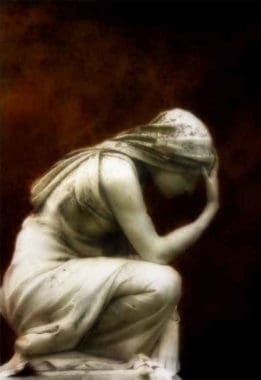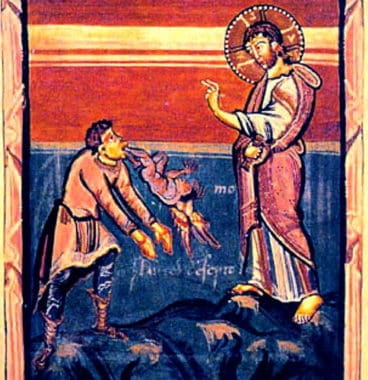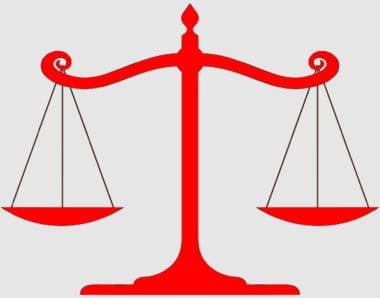Does God Heal After Death?
People who do evil are sick…and, at death, God will heal them.
In my last post, God’s Not Mean so Hell’s Not Possible, I related a conversation that I had recently. My friend had asserted that since God is all good He wouldn’t possibly send anyone to hell and eternal suffering. What bolstered his argument was this assertion:  people who do evil are sick (i.e. it’s not their fault) and when we die, won’t God heal us all? And once healed, without the encumbrance of sickness, won’t those sick individuals who did evil automatically choose the good and choose heaven? Well, maybe, I guess…
people who do evil are sick (i.e. it’s not their fault) and when we die, won’t God heal us all? And once healed, without the encumbrance of sickness, won’t those sick individuals who did evil automatically choose the good and choose heaven? Well, maybe, I guess…
It’s an interesting idea. Certainly, there are some illnesses that make us do things over which we have no control. I’ll never forget my neighbor when I was a teenager – a lovely woman in her early thirties battling a brain tumor. Our cat ran across her lawn and she went ballistic and started screaming at me. I naturally felt hurt and my dad quickly pointed out that she had a brain tumor and probably couldn’t control her reaction. It certainly was out of character for her to respond that way. So, sure, some physical illnesses that affect our brains compromise us and would mitigate, and often negate, any culpability for our actions.
But the kind of sickness to which my friend referred was of more of a psychological nature: people who were perhaps wounded and traumatized in childhood, and are compromised in their ability to choose the good; or individuals with mental illnesses or personality disorders that compel them toward actions they might otherwise reject if they were “in their right minds.” In other words, “they know not what they do.”
This is trickier to evaluate. Whereas psychological and emotional illness can certainly mitigate, and perhaps in some cases even eliminate culpability for our actions, that is not always the case. That argument simply denies the reality of free will. We are all wounded by original sin, making doing good difficult at times as we navigate our fallen nature. That’s what this battlefield of life is all about. Most of us have suffered some damage in our childhoods or as adults – hurts, neglect, betrayals, discrimination, persecutions etc. Yet people with similar histories can respond to life very differently, some with heroic virtue and others with horrific sin. Even siblings from the same abusive home can land on opposite ends of the moral spectrum. The history books are full of stories of saints who suffered from emotional and psychological disorders and chose good and grew in sanctity. History also recounts the tragic childhoods of tyrants and despots who responded with unspeakable evil. We would have to conclude that psychological disorders do not automatically negate our free will and we still bear at least some responsibility for our actions.
 But don’t misunderstand me. There certainly are many people suffering with mental illnesses and even depression, or extreme anxiety, that have trouble controlling their crankiness and are more likely to behave badly. Sometimes what appears to be sinful in the eyes of the beholder is indeed a symptom of some illness. Hence the reason we cannot rightly judge anyone. That’s why the Church has never solemnly defined that any particular person is in hell, even the likes of Judas Iscariot or Adolf Hitler. The Church does, however, maintain that there is a hell and there are souls that wind up there. Jesus Himself made frequent references to Hell (aka fiery Gehenna) in the gospels. More liberal scripture scholars and theologians may assert that He was speaking metaphorically but that amounts more to wishful thinking than it does to biblical fact. On the matter of hell, Jesus was abundantly clear: it’s real and you want to avoid it at all costs, even that of your physical life here on Earth.
But don’t misunderstand me. There certainly are many people suffering with mental illnesses and even depression, or extreme anxiety, that have trouble controlling their crankiness and are more likely to behave badly. Sometimes what appears to be sinful in the eyes of the beholder is indeed a symptom of some illness. Hence the reason we cannot rightly judge anyone. That’s why the Church has never solemnly defined that any particular person is in hell, even the likes of Judas Iscariot or Adolf Hitler. The Church does, however, maintain that there is a hell and there are souls that wind up there. Jesus Himself made frequent references to Hell (aka fiery Gehenna) in the gospels. More liberal scripture scholars and theologians may assert that He was speaking metaphorically but that amounts more to wishful thinking than it does to biblical fact. On the matter of hell, Jesus was abundantly clear: it’s real and you want to avoid it at all costs, even that of your physical life here on Earth.
I think this modern virtue of not judging is the real problem at issue here. Whereas we are not to judge people, too many today interpret that to mean we don’t judge actions, that anything is really okay, and there is no such reality as sin. Hence a clarification is in order here. Sin is a judgment of the act of a person endowed with free will when they transgress the moral order. When we refer to sin we are assuming the free will of the individual choosing to commit an immoral or evil act, or to willfully not perform a virtuous act when it is expected, or required that they do so. If indeed someone lacks free will their culpability may be limited but the act itself remains a moral evil.
 Clearly, this non-judgmental approach to sinners may seem compassionate but it has contributed greatly to upturning the moral order in our present day culture. Once the idea of sin and hell are eliminated from the equation, a laissez-faire attitude begins to permeate society. Instead of pursuing virtue, many pursue vice, hedonism, and self-glorification. Some may assert that no one is truly at fault and that poor catechesis is to blame. There certainly is a case to be made there but it may not be enough to exonerate them. To suggest as much puts at risk of damnation for the very people this false compassion seeks to emancipate from blame.
Clearly, this non-judgmental approach to sinners may seem compassionate but it has contributed greatly to upturning the moral order in our present day culture. Once the idea of sin and hell are eliminated from the equation, a laissez-faire attitude begins to permeate society. Instead of pursuing virtue, many pursue vice, hedonism, and self-glorification. Some may assert that no one is truly at fault and that poor catechesis is to blame. There certainly is a case to be made there but it may not be enough to exonerate them. To suggest as much puts at risk of damnation for the very people this false compassion seeks to emancipate from blame.
 So do not judge another individual but leave that to God. At the moment of death, He who alone knows the heart and measures any mitigating factors will be the Just Judge. For those whose behavior was affected by sickness, He will surely show mercy and bring healing. He wants all His children home with Him in heaven…if that’s what they truly want. Even for those who may have lived notorious lives of sin who turn at the last moment to His mercy, heaven awaits them…but not right away in most cases. Those who have not completely eradicated sin from their lives and still struggle with “unheavenly” tendencies (and that is most of us), but die in a state of grace desiring heaven will, through His grace, be perfected for heaven. Believing in the reality of sin but that our sinfulness, even after our death, can be purged out of us (i.e. Purgatory) through the abundant Mercy of God so that we can enter heaven is the authentically compassionate approach we need to resurrect today.
So do not judge another individual but leave that to God. At the moment of death, He who alone knows the heart and measures any mitigating factors will be the Just Judge. For those whose behavior was affected by sickness, He will surely show mercy and bring healing. He wants all His children home with Him in heaven…if that’s what they truly want. Even for those who may have lived notorious lives of sin who turn at the last moment to His mercy, heaven awaits them…but not right away in most cases. Those who have not completely eradicated sin from their lives and still struggle with “unheavenly” tendencies (and that is most of us), but die in a state of grace desiring heaven will, through His grace, be perfected for heaven. Believing in the reality of sin but that our sinfulness, even after our death, can be purged out of us (i.e. Purgatory) through the abundant Mercy of God so that we can enter heaven is the authentically compassionate approach we need to resurrect today.
+
Art: Mirror of Fragile Emotion, Don from Murfreesboro TN, 19 April 2010, CCA 2.0 Generic; Mirror of Healing of the Demon-Possessed, artist unknown, Medieval Age, PD-US author’s life plus 70 years or less; Balanced scale of justice, Perhelion, 15 July 2011, PD-Worldwide; St. Michael parish church in Mondsee (Upper Austria), Altar of the poor souls ( 1679-1684 ) by Meinrad Guggenbichler – Painting by C.P.List – poor soul (detail), Wolfgang Sauber photographer, 11.05.2009 own work, CCA-SA 3.0 Unported; all Wikimedia Commons.




